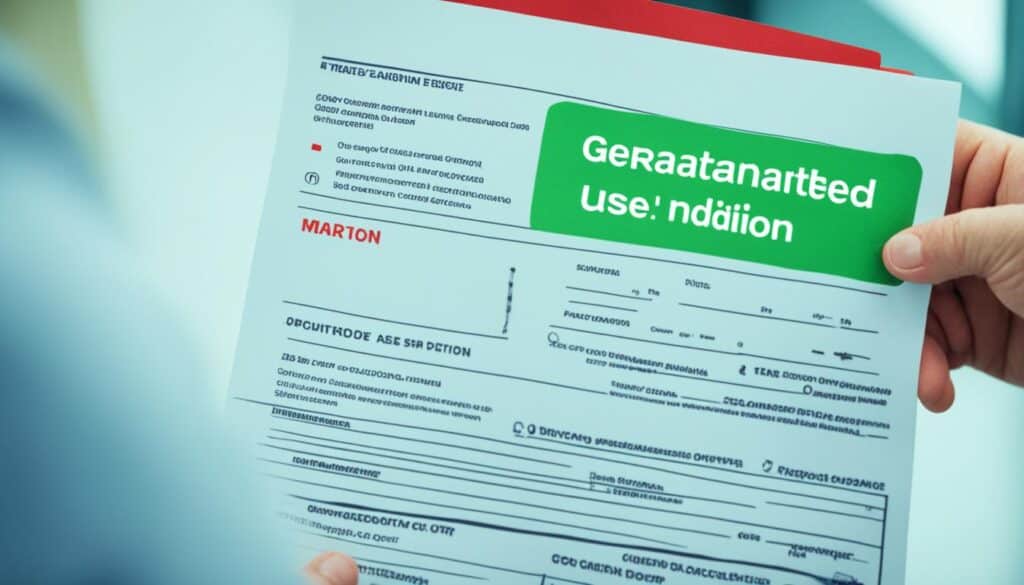When it comes to getting insurance coverage, having a pre-existing condition can raise concerns. Many individuals worry about whether they will be able to obtain insurance, how their condition will impact their coverage, and what options are available to them. In this article, we will explore the topic of insurance coverage for pre-existing conditions and provide you with the information you need to navigate your health plan options confidently.
Key Takeaways:
- All Marketplace plans must cover treatment for pre-existing medical conditions.
- No insurance plan can reject you, charge you more, or refuse to pay for essential health benefits based on your pre-existing condition.
- Medicaid and CHIP also cannot refuse to cover you or charge you more because of your pre-existing condition.
- Under the Affordable Care Act (ACA), insurance companies cannot deny coverage, charge more, or refuse to pay for essential health benefits based on pre-existing conditions.
- The type and severity of a pre-existing condition can influence healthcare services required and potentially lead to higher overall healthcare costs.
Coverage for Pre-existing Conditions
Under the Affordable Care Act (ACA), all Marketplace plans must provide coverage for pre-existing conditions. In other words, insurance companies are prohibited from denying coverage, charging higher premiums, or refusing to pay for essential health benefits based on an individual’s pre-existing conditions.
This coverage extends to Medicaid and the Children’s Health Insurance Program (CHIP) as well. It ensures that individuals with health problems or chronic illnesses can still receive the necessary medical treatment and care without facing financial barriers.
“The ACA has been instrumental in ensuring that individuals with pre-existing conditions have access to the coverage they need.”
Insurance companies are now required to provide equal opportunities for individuals with pre-existing conditions to secure affordable health insurance plans.
| Benefits | Marketplace Plans | Medicaid and CHIP Plans |
|---|---|---|
| No denial of coverage | ✓ | ✓ |
| No increased premiums | ✓ | ✓ |
| No refusal of essential health benefits | ✓ | ✓ |
Examples of Pre-existing Health Conditions

Pre-existing health conditions encompass a wide range of conditions, including chronic illnesses and common ailments. These conditions can significantly impact an individual’s health and may require ongoing medical care. Some examples of pre-existing health conditions are:
- Cancer
- Diabetes
- Asthma
- Epilepsy
- Depression
- Pregnancy before enrollment
Additionally, there are other less severe conditions that may qualify as pre-existing health conditions, such as acne, anxiety, and sleep apnea. It’s important to note that the severity and impact of these conditions can vary from person to person, and each individual’s situation should be assessed on a case-by-case basis.
Having a pre-existing health condition can present unique challenges when it comes to obtaining health insurance coverage. However, under the Affordable Care Act (ACA), insurance companies cannot deny coverage, charge higher premiums, or refuse to pay for essential health benefits based on pre-existing conditions. This ensures that individuals with pre-existing health conditions have access to the necessary medical care and treatments they require.
Impact of Pre-existing Conditions on Health Insurance

Pre-existing conditions can have implications on both eligibility and premium costs for health insurance. Under the Affordable Care Act (ACA), insurers are prohibited from denying coverage or charging higher premiums solely based on pre-existing conditions. However, the type and severity of a pre-existing condition can influence the healthcare services required and potentially lead to higher overall healthcare costs.
In terms of eligibility, the ACA ensures that individuals with pre-existing conditions have the right to obtain health insurance coverage. Insurance companies can no longer deny coverage to individuals with pre-existing conditions, ensuring that everyone has an opportunity to access necessary healthcare services.
Regarding premium costs, the ACA establishes community rating rules that prevent insurers from charging higher premiums based solely on pre-existing conditions. Instead, premiums are primarily determined by factors such as age, location, and tobacco use, ensuring that individuals with pre-existing conditions are not financially penalized.
While the ACA provides important protections for individuals with pre-existing conditions, it’s important to note that the type and severity of a pre-existing condition can impact the healthcare services required and potentially lead to higher overall healthcare costs. Insurance coverage for pre-existing conditions ensures access to necessary treatments and services, but the cost of providing comprehensive coverage for complex conditions may result in higher premiums.
Insurers may assess the risk associated with different pre-existing conditions and adjust premium costs accordingly. However, the ACA prohibits insurers from denying coverage or charging higher premiums based solely on pre-existing conditions, ensuring that individuals have access to the care they need, regardless of their health history.
Overall, the ACA has played a crucial role in protecting individuals with pre-existing conditions by prohibiting insurers from denying coverage or charging higher premiums. However, it’s important for individuals to carefully review their policy options and consider the potential impact of their pre-existing condition on their healthcare needs and premium costs.
The Impact of Pre-existing Conditions on Health Insurance Eligibility:
- Under the ACA, all individuals, including those with pre-existing conditions, have the right to obtain health insurance coverage.
- Insurers are prohibited from denying coverage to individuals with pre-existing conditions.
- Guaranteed coverage ensures that individuals can access necessary healthcare services.
The Impact of Pre-existing Conditions on Premium Costs:
- The ACA establishes community rating rules to prevent insurers from charging higher premiums based solely on pre-existing conditions.
- Premiums are primarily determined by factors such as age, location, and tobacco use.
- The cost of providing comprehensive coverage for complex conditions may result in higher premiums.
Changes due to the Affordable Care Act (ACA)

The Affordable Care Act (ACA) brought about significant changes in how health insurance companies handle pre-existing conditions. Prior to the ACA, individuals with pre-existing conditions often faced denied coverage or higher premiums, making it difficult for them to obtain the necessary health insurance coverage they needed. However, with the implementation of the ACA, these practices were deemed illegal.
Insurance companies are now prohibited from denying coverage or charging higher premiums solely based on pre-existing conditions. This means that individuals with pre-existing conditions are now able to access health insurance without being subject to discrimination or financial burden.
“No insurance plan can reject you, charge you more, or refuse to pay for essential health benefits for any condition you had before your coverage started.” – Affordable Care Act
Essential health benefits are a crucial component of the ACA. All health insurance plans offered in the individual and small group markets are required to cover these essential health benefits. These benefits include a wide range of services, such as outpatient care, emergency services, hospitalization, maternity and newborn care, mental health services, and prescription drugs. By mandating the coverage of essential health benefits, individuals with pre-existing conditions can access the necessary healthcare services they need.
| Key Changes due to ACA | Impact |
|---|---|
| Denied Coverage | No longer allowed |
| Higher Premiums | No longer allowed |
| Essential Health Benefits | Required to be covered |
Guaranteed Issue and Pre-existing Conditions

One of the key provisions of the Affordable Care Act (ACA) is the concept of guaranteed issue, which ensures that health insurance providers must offer coverage to all individuals, regardless of their health history. This means that individuals with pre-existing conditions cannot be denied coverage or charged higher premiums based on their health history.
The ACA has brought significant changes to the health insurance landscape, making it easier for individuals with pre-existing conditions to obtain the coverage they need. Prior to the ACA, insurance companies could deny coverage or impose exclusions on individuals with pre-existing conditions, leaving many without access to essential healthcare services.
The guaranteed issue requirement applies to all health insurance plans offered on the Marketplace, as well as Medicaid and the Children’s Health Insurance Program (CHIP). Whether you’re seeking coverage through a private insurer or a government program, you are protected under the ACA’s guaranteed issue provision.
Here’s how guaranteed issue benefits individuals with pre-existing conditions:
- Access to Coverage: Regardless of your health history, health insurance providers are required to offer you a health plan. You cannot be denied coverage based on pre-existing conditions.
- Equal Premium Rates: Insurers cannot charge higher premiums based on your health history. Your premium rates must be the same as those offered to individuals without pre-existing conditions.
- Essential Health Benefits: All plans, including those offered on the Marketplace, must cover essential health benefits, such as preventive services, prescription drugs, hospitalizations, and maternity care. This ensures that individuals with pre-existing conditions have access to necessary medical treatments.
By guaranteeing coverage for individuals with pre-existing conditions, the ACA has expanded access to healthcare and provided peace of mind for millions of Americans. No longer can insurers discriminate against individuals based on their health history, ensuring that everyone has a fair opportunity to obtain comprehensive health insurance.
“The ACA’s guaranteed issue provision has been a game-changer for individuals with pre-existing conditions. It has leveled the playing field, allowing everyone to access the coverage they need, regardless of their health history.” – John Smith, Health Policy Expert
Comparison of Health Insurance Coverage Options
| Coverage Options | Availability | Eligibility Criteria |
|---|---|---|
| Employer-Sponsored Health Insurance | Offered by employers | Dependent on employment status |
| ACA Marketplace Plans | Available through state-based Marketplaces | Available to individuals and families, regardless of employment status |
| Medicaid | Offered by state governments | Income-based eligibility |
| CHIP | Offered by state governments | Income-based eligibility for children |
The table above provides a comparison of different health insurance coverage options. While employer-sponsored insurance is the most common form of coverage, ACA Marketplace plans, Medicaid, and CHIP offer alternative options for individuals with pre-existing conditions.
Understanding Waiting Periods and High Risk Pools

When it comes to health insurance coverage for pre-existing conditions, it’s essential to be aware of waiting periods and high-risk pools. These factors can impact the coverage start date and availability of insurance options for individuals with pre-existing conditions.
Some health insurance plans may require waiting periods before pre-existing conditions are fully covered. During this waiting period, individuals may have limited coverage for their pre-existing conditions. It’s important to carefully review the terms and conditions of each insurance plan to understand the specific waiting period requirements.
Previously, high-risk pools were established as a solution for individuals with pre-existing conditions who were unable to secure coverage in the regular insurance market. These pools provided coverage options for those deemed high risk by private insurers. However, the implementation of the Affordable Care Act (ACA) has significantly reduced the need for high-risk pools by mandating coverage for pre-existing conditions in all insurance plans.
The ACA ensures that individuals with pre-existing conditions cannot be denied coverage, charged higher premiums, or have their essential health benefits refused based on their medical history. This provision eliminates the need for high-risk pools and creates a more accessible and equitable insurance market for all individuals, regardless of their health status.
Impact of Waiting Periods
Waiting periods can affect individuals who need immediate coverage for their pre-existing conditions. During the waiting period, individuals may have to pay out-of-pocket for their medical expenses related to the pre-existing condition. It’s important to carefully review the waiting period details and consider alternative coverage options if immediate coverage is needed.
It’s also essential to note that waiting periods typically do not apply to all health insurance plans. Some plans may not have waiting periods at all, while others may have varying waiting periods depending on the specific condition. Understanding the waiting period requirements is crucial in selecting the most suitable health insurance plan for your needs.
Overview of High-Risk Pools
High-risk pools were designed to provide coverage options for individuals with pre-existing conditions who were unable to secure insurance in the regular market. These pools were managed by state governments and aimed to ensure that individuals with pre-existing conditions had access to affordable health insurance.
While high-risk pools served as a safety net for individuals with pre-existing conditions, they often had higher premiums and limited coverage compared to plans available in the regular market. The ACA addressed these shortcomings by mandating coverage for pre-existing conditions in all insurance plans, eliminating the need for high-risk pools.
Comparison of Waiting Periods and High-Risk Pools
| Factors | Waiting Periods | High-Risk Pools |
|---|---|---|
| Coverage Start Date | May require a waiting period before pre-existing conditions are fully covered. | Immediate coverage options for individuals with pre-existing conditions. |
| Availability | Applies to select health insurance plans. | Managed by state governments, serving individuals unable to obtain coverage in the regular market. |
| Premiums | Varies depending on the specific plan. | Higher premiums compared to plans available in the regular market. |
| Coverage Limits | May have limited coverage during the waiting period. | May have more limited coverage compared to plans available in the regular market. |
By eliminating the need for high-risk pools, the ACA has ensured that individuals with pre-existing conditions have a broader range of coverage options available to them. It’s crucial to explore different insurance plans, review waiting period requirements, and compare coverage terms to find the best health insurance solution for your specific needs.
State-specific Regulations and Alternative Options

When it comes to health insurance, state-specific regulations can play a significant role in determining policies, rules, and application processes. Understanding these unique regulations is crucial for individuals seeking coverage. Additionally, each state has its own approach to Medicaid expansion, state-run marketplaces, and insurance mandates, further influencing the availability and affordability of health insurance options.
Medicaid Expansion
Medicaid expansion refers to the decision made by individual states to extend Medicaid coverage to a broader population. While the Affordable Care Act (ACA) provided the opportunity for states to expand Medicaid eligibility, not all states have implemented this expansion. The decision to expand Medicaid can significantly impact access to health insurance for low-income individuals and families.
State-Run Marketplaces
In some states, the health insurance marketplace is managed by the state government rather than the federal government. These state-run marketplaces offer individuals and small businesses a platform to compare and purchase health insurance plans. The availability of state-run marketplaces varies, and some states choose to rely on the federal marketplace instead.
Insurance Mandates
Insurance mandates are regulations that require certain types of health insurance coverage to be provided. These mandates can vary from state to state and may include specific coverage requirements for essential health benefits, preventive services, or specific medical conditions. It is important to be aware of the insurance mandates in your state to ensure that your health insurance plan meets all necessary requirements.
Additional Benefits
Beyond the coverage provided through traditional health insurance plans, some states offer additional benefits and programs to support residents’ healthcare needs. These additional benefits may include dental and vision coverage, prescription drug assistance programs, or special programs for individuals with specific medical conditions.
Exploring alternative options for affordable health insurance is also essential. Below are some alternatives to consider:
- Medicaid: Medicaid is a government program that provides health insurance to low-income individuals and families. Eligibility for Medicaid varies by state, but it is often available to individuals with limited income and resources.
- Subsidized Plans through ACA Marketplaces: The Affordable Care Act created marketplaces where individuals and families can shop for health insurance plans and access premium subsidies based on their income. These subsidies can help reduce the cost of monthly premiums.
- Catastrophic Health Plans: Catastrophic health plans are designed to provide coverage in case of serious medical emergencies. These plans typically have lower monthly premiums but higher deductibles and out-of-pocket costs.
- Community Health Centers: Community health centers offer primary care services, including preventive care, treatment for acute and chronic conditions, and referrals to specialized care. These centers often provide services on a sliding fee scale based on income.
| State | Medicaid Expansion | State-Run Marketplace | Insurance Mandates | Additional Benefits |
|---|---|---|---|---|
| California | Yes | Yes | Yes | Dental, Vision |
| Texas | No | No | No | Prescription Assistance |
| New York | Yes | Yes | Yes | Mental Health Services |
| Florida | No | No | Yes | Specialized Care Programs |
Also Read : Pet Health Coverage With Pets Best Insurance
Conclusion
The Affordable Care Act (ACA) has revolutionized health insurance for individuals with pre-existing conditions. Under the ACA, health insurance plans are required to provide coverage for pre-existing medical conditions, eliminating the ability for insurance companies to reject applicants or charge higher premiums based on their health history.
With the ACA in place, individuals with pre-existing conditions have a wide range of coverage options to choose from. Whether it’s through Marketplace plans, Medicaid, or the Children’s Health Insurance Program (CHIP), there are avenues for obtaining the health insurance coverage needed to manage their conditions.
However, it’s important to understand that health insurance regulations can vary by state, so it’s crucial to be aware of the specific rules and benefits in your state when exploring health insurance options. Medicaid expansion, state-run marketplaces, and insurance mandates can all impact the coverage and affordability of health insurance plans.
In conclusion, thanks to the Affordable Care Act, individuals with pre-existing conditions have greater access to health insurance coverage. By understanding their coverage options and the regulations in their state, individuals can make informed decisions about their health insurance needs and ensure that they receive the necessary medical care for their pre-existing conditions.
FAQs
Q: Can I get health insurance if I have a pre-existing condition?
A: Yes, thanks to the passage of the Affordable Care Act on March 23, health insurers are now required to cover pre-existing conditions. You can get coverage even if you have a pre-existing condition.
Q: Are there any exceptions to getting health insurance with a pre-existing condition?
A: There are no longer exceptions, as the law now mandates that health insurance plans cannot deny coverage based on pre-existing conditions.
Q: Can I get private health insurance if I have a pre-existing condition?
A: Yes, you can obtain private health insurance even if you have a pre-existing condition. Insurers are now required to provide coverage regardless of pre-existing conditions.
Q: What options do I have for health insurance for pre-existing conditions?
A: You can explore individual health insurance plans or family health insurance plans that cover pre-existing conditions. You can also check with eHealth for available options.
Q: Can health insurance companies refuse coverage for pre-existing conditions?
A: No, health insurers cannot refuse coverage for pre-existing conditions anymore. The law prohibits the refusal of coverage based on existing health conditions.
Q: What is a “pre-existing condition” when it comes to health insurance?
A: A pre-existing condition is a health condition that exists before the date that new health coverage starts. Insurance plans now must cover conditions like these without denial.
Q: Can I get insurance coverage for pre-existing conditions through short-term plans?
A: Short-term health insurance plans may not always cover pre-existing conditions, so it’s essential to review the policy details before signing up for coverage.
Source Links
- https://www.healthcare.gov/coverage/pre-existing-conditions/
- https://www.cigna.com/knowledge-center/what-is-a-pre-existing-condition
- https://www.ehealthinsurance.com/resources/individual-and-family/health-insurance-for-pre-existing-conditions